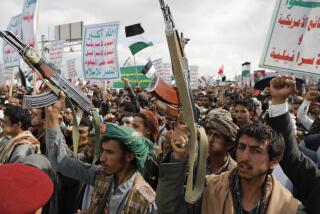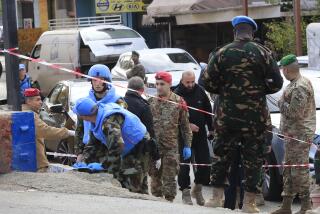U.N. Officer Detained, Freed in Lebanon : But Israeli-Backed Militia Still Holds 20 Finnish Peacekeepers
- Share via
JERUSALEM — The South Lebanon Army detained and then released a senior French U.N. officer Sunday but refused for the third day to free 20 other U.N. peacekeeping soldiers as long as a rival militia continues to hold a group of 11 of its own men.
The officer, Lt. Col. Jean-Michel Bilendjan, was dispatched Friday to the town of Qantara in Lebanon, about five miles north of the Israeli border, after the Israeli-backed South Lebanon Army seized as hostages 23 Finnish troops of the U.N. Interim Force in Lebanon. It acted in retaliation for the capture or defection of 11 of its members.
Bilendjan was sent to check on the condition of the hostages and to serve as liaison officer between the South Lebanon Army and the interim force headquarters.
Timor Goksel, spokesman at U.N. headquarters in Naqoura, Lebanon, said Bilendjan was made a hostage when the South Lebanon Army refused to allow him to leave Qantara on Sunday morning.
Early Sunday evening, however, the French officer was freed after Israeli Prime Minister Shimon Peres personally intervened on his behalf with Gen. Antoine Lahad, a retired Lebanese army officer whom the Israelis placed in charge of the army, a largely Christian militia outfit, after the death of its founder last year.
Lahad released three of the Finns late Saturday as “a good-will gesture,” but he flatly refused to let the remaining 20 Finnish hostages go as long as Amal, the Shia Muslim militia, retains the 11 SLA members who fell into its hands Friday morning in the incident that started the present confrontation.
No Public Push for Release
Peres acted quickly on behalf of the French officer, but the Israeli authorities have not yet responded publicly to requests that they put pressure on Lahad to quickly release the 20 captive Finns still held hostage.
The Foreign Ministry has said that “we promised . . . in meetings between the Finnish prime minister and Prime Minister Peres and between Foreign Minister (Yitzhak) Shamir and the Finnish foreign minister to do everything possible to keep them safe.”
When asked directly if Israel was doing anything directly to persuade Lahad to release the Finns, ministry officials would only repeat the pledge to look after the safety of the Finnish U.N. troops.
Goksel said that the French officer was released in good condition, although “that isn’t to say they didn’t manhandle and push him around.” He added that the Finnish hostages, who were held for a time in the bus in which they were traveling when captured, have now been removed from the bus and taken to an unknown location.
It was assumed, however, that their new location is still within the narrow so-called security zone that the Israelis established north of the border as a measure of protection for their northernmost settlements after announcing they were ending their three-year occupation of southern Lebanon.
Goksel said the United Nations is counting on the assurances of Israel and the South Lebanon Army that the hostages are safe and well.
And while Israel has repeatedly given those assurances, its military command said Sunday evening that no foreign journalists will be allowed to cross into Lebanon to independently judge the situation.
Before that ban, foreign reporters were allowed across the frontier either under Israeli military escort or for purposes of visiting the U.N. headquarters at Naqoura.
Frequently, however, some reporters would continue beyond the U.N. facilities to tour the region on their own in search of information.
While no Israeli official has publicly condoned the kidnaping of the Finns, Israel has backed Lahad’s demand that the 11 South Lebanon Army men be returned in exchange for their release. Increasingly, too, Israel is blaming the U.N. Interim Force in Lebanon (UNIFIL) in general and the Finnish brigade in particular for the crisis.
The sharpest definition of the Israeli position came during a Tel Aviv news conference by Defense Minister Yitzhak Rabin, just back from New York where he had several conversations with U.N. officials and other diplomats about the situation.
Denying that the 11 South Lebanon Army men, all Shia Muslims, had defected to Amal, Rabin asserted that “a UNIFIL force, whether at local initiative or acting under orders from above, disarmed an SLA unit.”
Because this took place under Amal influence, Rabin argued that it was essentially “the abandonment of the SLA soldiers to hostile elements which had not been disarmed by UNIFIL.”
Pursuing a long-held Israeli claim that the U.N. peacekeeping force has never been truly neutral since the Security Council authorized an international force to patrol southern Lebanon in 1978, Rabin said UNIFIL should not discriminate “between one militia and another.”
Israel supports the South Lebanon Army as a key element in keeping a strip of territory north of its border secure against Palestinian and other anti-Israeli guerrillas. The United Nations does not accept the legitimacy of the force and frequently tries to disarm its men.
Adding that UNIFIL “bears direct responsibility for the incident,” Rabin said he will “raise this incident with all due seriousness” when U.N. Undersecretary General Brian Urquhart arrives in Israel on Tuesday for a long-scheduled meeting with Israeli officials.
Meanwhile, Irish Gen. William Callaghan, overall U.N. commander in southern Lebanon, said that he has ordered an inquiry into the situation.
More to Read
Sign up for Essential California
The most important California stories and recommendations in your inbox every morning.
You may occasionally receive promotional content from the Los Angeles Times.













